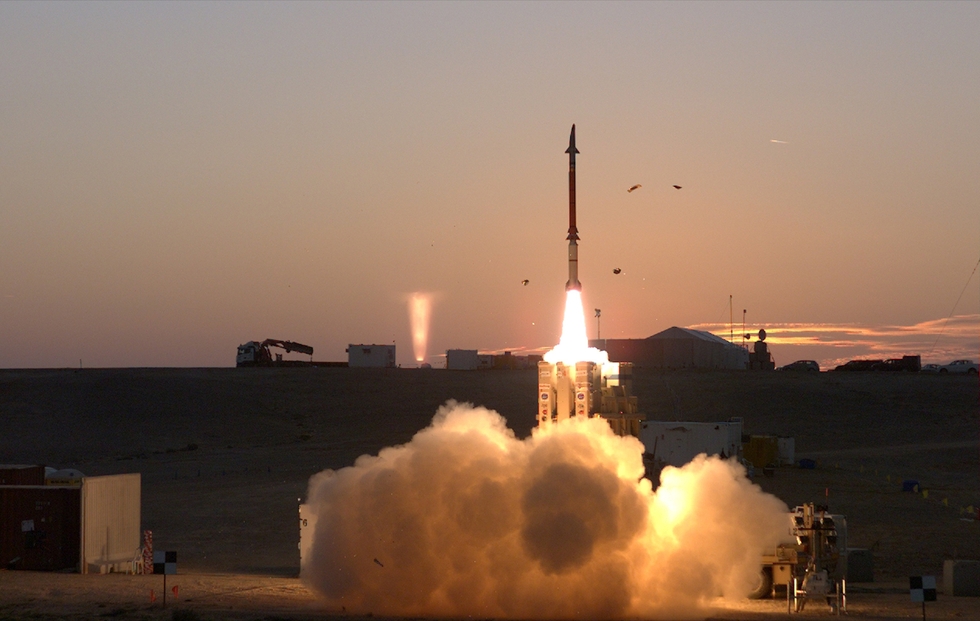Privatising Israel's arms industry

Long before the state of Israel was founded, Israeli Military Industries (IMI) was established in 1933 to provide arms for the Jewish militias in Palestine. The company grew to become Israel’s fifth largest arms company and 45th largest industrial company in Israel.
IMI employs about 3,600 workers, and produces ammunition, electronic systems and mobile military bridges. It also attempts to enter the “homeland security” market, and has confidential lines of production.
As part of Israel’s state-owned arms industry, IMI enjoys the prestige that comes from having its products used by the Israeli military. However, the company demonstrates that Israel’s arms industry is not purely a success story. The cracks in Israel’s arms exports expose the problem with the industry’s business model.
The decision to privatise
In 1996, the US arms giant Lockheed Martin approached the Israeli government with an offer to buy IMI. The Israeli government refused, arguing that IMI is not just a company, but a strategic asset for the Israeli military.
The government argued that the military needs constant access to the company’s production lines, and the ability to demand quick adaptations to the weapons it produces and to demand rapid efforts to replenish stocks of ammunition in times of war.
However, a constant pattern in Israel’s economy since the 1990s is that private investors who target government companies and wish to buy them, have the means to portray these companies as failing, to mobilise the corporate media to discuss such companies as liabilities, and thus to increase the pressure to privatise.
This procedure was used in the process of privatising Israel’s largest corporations: Bank Hapoalim, Bezek, El-Al, Koor, Zim and others, always to the benefit of the investors who purchase the underpriced corporation.
In the years that followed Lockheed Martin’s rejected offer, IMI’s share in Israel’s security cake started to shrink. Ministry of Defence officials and the company’s management knew that if the company became financially fragile, it will be sold for a fraction of its value and that they could hope for a lucrative job with whichever company ended up buying IMI, as has happened in other privatisation cases in Israel.
The Israeli corporate media called openly for urgent privatisation. The Knesset was called to approve emergency loans to keep the company afloat, and in 2005 the government reversed its decision about privatisation and resolved to sell off the company.
Sweetening the deal
Over the past 10 years, the government struggled to push the privatisation forward. It decided to place restrictions on the process: foreign investors would only be allowed to buy the company if they cooperate with an Israeli partner to ensure the company remained Israeli.
Some of the factories were removed from IMI because of their sensitive nature. However, restrictions deter investors, as did the 2010 warning of Israel’s manager of the Government Company Authority, Doron Cohen, that IMI is poorly managed, suffers from heavy debts and from a deficit in its cash flow. The company’s reputation suffered, and the government’s hopes to raise revenue from the sale of the company were undermined.
In order to attract investors to bid for the company, the government approved far-reaching and costly benefits: adding a profitable company to the privatisation deal (the vehicle armour factory “Ashot Ashkelon”); severance pay for over a thousand workers to be laid off at the government expense; a commitment by the Ministry of Defence to keep buying IMI products worth $550mn until 2018; debt-forgiveness and more.
The tender collapses
Despite the government’s efforts, investors which have expressed initial interest in purchasing IMI started pulling out one by one in protest. Sami Katzav, who previously bought one of IMI’s factories, argued that the tender strongly favours Elbit Systems. Today, Elbit Systems, owned by Miki Federman, remains the sole contender. The Tender Committee decided to push ahead with the tender, thereby ensuring that Elbit will win unopposed and pay only the minimum price.
Miki Federman, who already owns both Elbit Systems and Dan Hotels, will be in possession of the largest arms company in Israel. Elbit is already second place right now (after the government-owned Israeli Aerospace Industries or IAI). Federman is a known friend of Ehud Barak, former Israeli prime minister and minister of defence. He is well connected in Israel’s economic and political circles and wields significant influence.
Elbit already has monopoly over supplying the Israeli military with certain kinds of equipment, maintenance and training, a fact that was criticised by the state comptroller because of the dependency which the Israeli military develops on a private company. After purchasing IMI, Elbit Systems will become the largest supplier to the Israeli military and will be able to set its prices as it wills.
What a monopoly means
Both Elbit Systems and IMI frequently use Israel’s military operations to promote their products. This leads many to the false conclusion that the Israeli economy profits from war, when in fact a large part of the income of the arms companies comes from its largest customer: the Israeli military, paid for by Israeli taxpayers.
Many governments realise that Israel’s dazzling military technology fails to keep the Palestinian population docile, and cannot protect Israel’s dwindling international standing. There are some things which military technology simply cannot solve.
Although a constant state of violence in the Middle East is the bread and butter of the arms industry (and not just the Israeli one), Israel’s arms exports are stagnating. These companies survive only thanks to their biggest customer: the Israeli Ministry of Defence.
Israel already dedicates a larger proportion of its government budget to military and security compared to all OECD countries and any further increase in the defence budget comes at the direct expense of Israel’s fragile public services. If Elbit Systems were to become an even greater monopoly and raise its prices further, it will further increase the security burden on Israel’s economy. Can Israel afford that?
- Shir Hever is a graduate student at the Free University of Berlin, and an economist with the Alternative Information Centre.
The views expressed in this article belong to the author and do not necessarily reflect the editorial policy of Middle East Eye.
Photo: Tests being undertaken for Israel's David Sling's missile defence system, a medium-range interceptor, developed with United States backing, at an unknown location in Israel on 21 December, 2015 (AFP/HO/ISRAEL DEFENCE MINISTRY).
New MEE newsletter: Jerusalem Dispatch
Sign up to get the latest insights and analysis on Israel-Palestine, alongside Turkey Unpacked and other MEE newsletters
Middle East Eye delivers independent and unrivalled coverage and analysis of the Middle East, North Africa and beyond. To learn more about republishing this content and the associated fees, please fill out this form. More about MEE can be found here.





